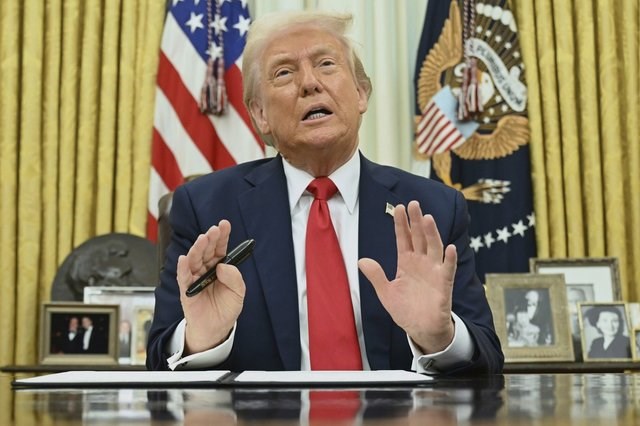
The United States government has listed Quebec's French-language reform as a barrier to trade, as President Donald Trump prepares to impose new tariffs on Canada. Trump speaks to reporters before signing an executive order in the Oval Office of the White House in Washington, Monday, March 31, 2025. (Pool via AP)
Republished April 01, 2025 - 11:59 AM
Original Publication Date April 01, 2025 - 8:51 AM
MONTREAL - Quebec has no intention of softening its language laws, Premier François Legault said Tuesday after the United States listed his government's French-language reform as a barrier to trade.
"It's non-negotiable," Legault told The Canadian Press during an economic mission in Hannover, Germany, one day before President Donald Trump is expected to impose new tariffs on Canada under the pretext that U.S. companies are being treated unfairly north of the border.
"There may be compromises we can make on certain products like aluminum," Legault said about Quebec's major export that has been hit with 25 per cent U.S. tariffs. "But there is no question of compromising on French."
On Monday, the office of the U.S. trade representative released a report on "foreign trade barriers" and included Quebec's Bill 96, a sweeping reform strengthening the province's language law. Describing the legislation as a "technical barrier to trade," the report says U.S. firms have complained about a provision set to take effect on June 1 requiring companies to translate into French any part of their trademark on product packaging that contains generic terms or descriptions of items.
"U.S. businesses have expressed concerns about the impact that Bill 96 will have on their federally registered trademarks," the document says.
Provisions of Quebec's 2022 language reform are being phased in gradually, with the provincial government describing the law as a moderate response to what it says is the declining use of French, particularly in Montreal.
The U.S. government's report is almost 400 pages long, and includes descriptions of what officials consider trade barriers in scores of countries, from Algeria to Vietnam. The section on Canada also includes supply management — which regulates dairy, poultry, and eggs in the country — limits on imports of bulk fruits and vegetables, and the barriers imposed by provincial liquor control boards.
The document is prepared every year for the president and members of the Senate and the House of Representatives, but the Quebec law did not appear on last year's edition. However, the administration of former president Joe Biden had raised concerns about the legislation's potential impacts on businesses and on trade between the U.S. and Canada.
Monday's report says that in June 2024, Biden officials "engaged with Canada" on Bill 96 at a committee of the World Trade Organization on technical barriers to trade. "The United States encouraged the Quebec provincial government to take into consideration business sector concerns and involve businesses in the drafting of further interpretive guidance on this law."
On Wednesday, Trump is expected to slap "reciprocal tariffs" on multiple countries — including Canada — in response to various alleged unfair trade practices.
In Quebec City, French Language Minister Jean-François Roberge told reporters it's "completely normal" for the only French-speaking state in North America to defend its language.
"I should point out that the United States signed a decree not long ago stating that English was the official and common language of the United States, so they should recognize that a state a little further north is doing the same thing," Roberge said of Trump's executive order.
The description of Bill 96 as a U.S. trade irritant became fodder on the federal election campaign trail Tuesday, with leaders promising not to weaken the law during upcoming trade negotiations with the U.S.
"The United States has no right to dictate our linguistic laws — or ANY of our laws," Conservative Leader Pierre Poilievre said in a post on X. "We are a proud, sovereign country."
Liberal Leader Mark Carney, speaking at a campaign stop in Winnipeg, said language will not be on the table when Canada and the U.S. review their free-trade deal.
"We will never engage in negotiations with the United States on subjects that impact the French language, culture and supply management," Carney said.
This report by The Canadian Press was first published April 1, 2025.
— with files from Thomas Laberge in Hannover, Germany.
News from © The Canadian Press, 2025